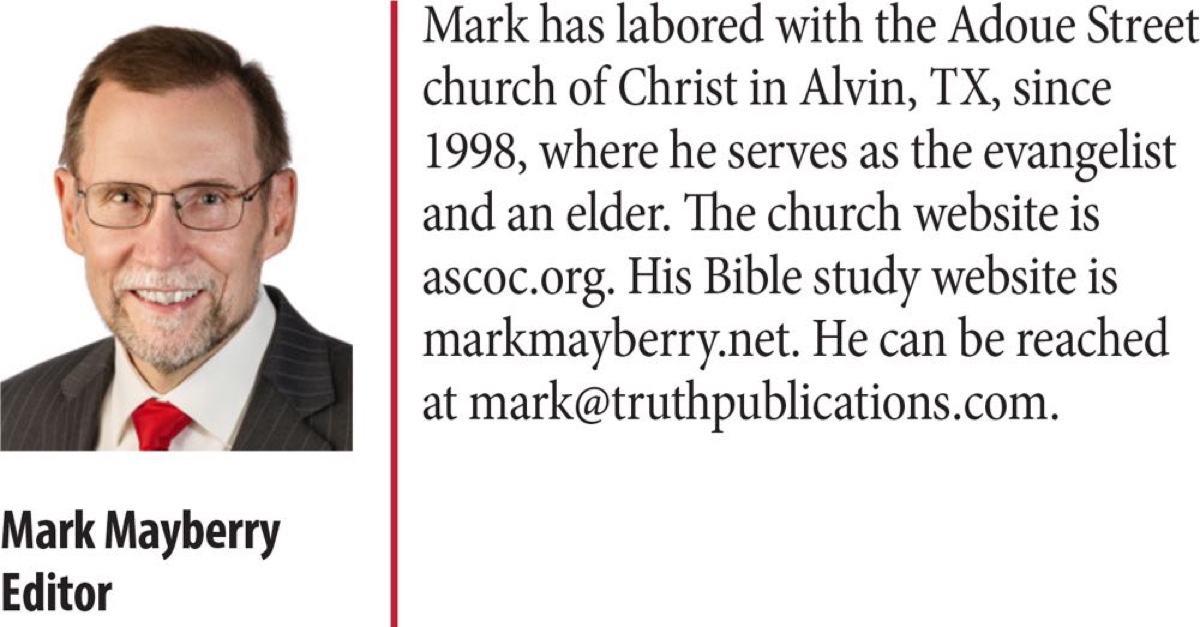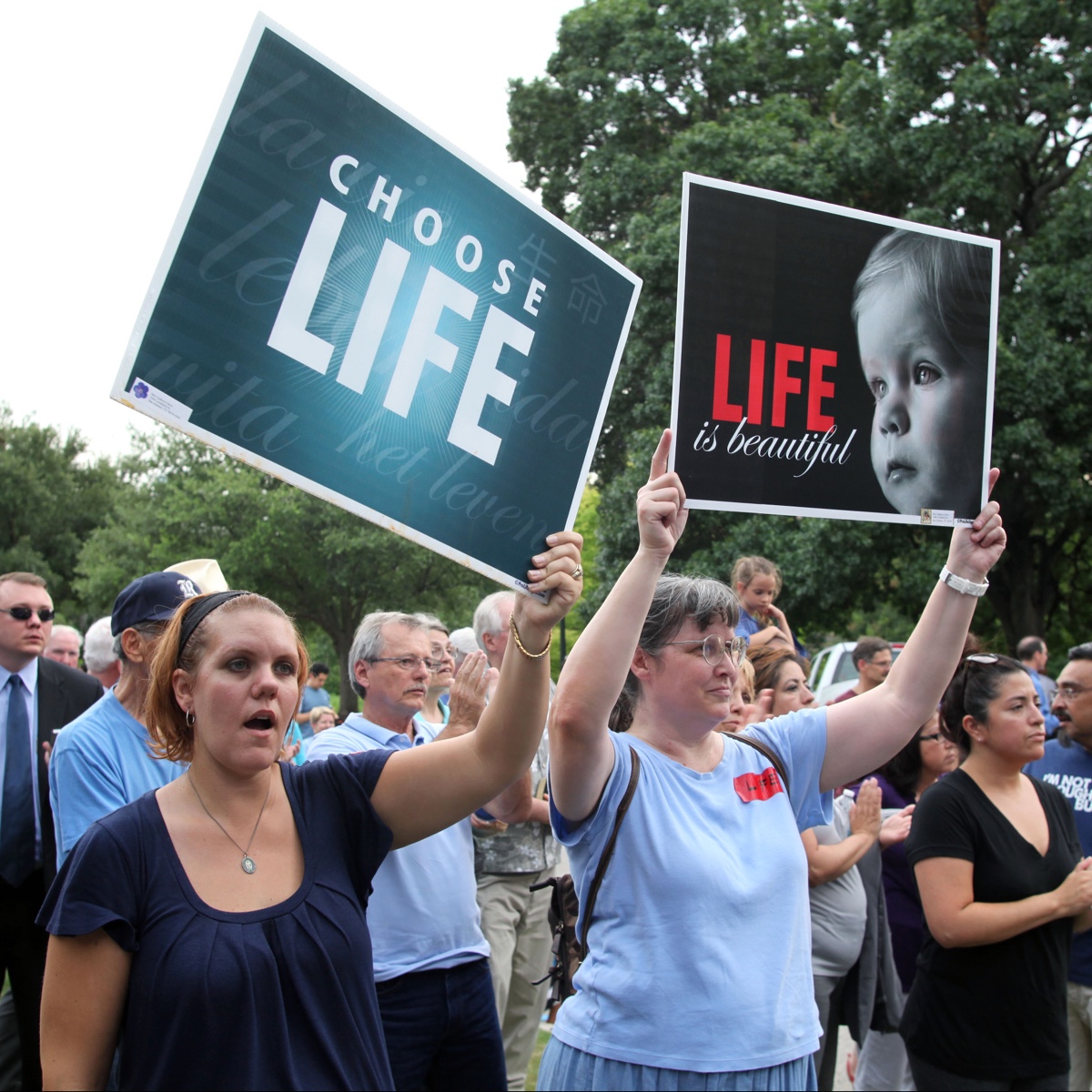By Mark Mayberry
Synopsis: Competing chants have marked the two sides of the abortion debate that divided this country since 1973: “Pro-Life” vs. “Pro-Choice.” Biblically speaking, Christians are called to value life and make proper choices.
On Friday, June 24, 2022, the U.S. Supreme Court set aside Roe v. Wade, negating as unconstitutional the previous decision that was enacted by the court in 1973. In reality, I doubted that I would ever see this day.
For fifty years, “Pro-Choice” and “Pro-Life” have offered competing chants and shouted slogans—reflecting the vast chasm that separates people on both sides of the debate over abortion.
Let’s step back from the current crisis (which is quickly devolving into chaos and criminality) and reflect upon what the Bible has to say about “Choice” and “Life.”
In the making of humanity, God created us in His own image—not as mere creatures of instinct, but as moral creatures of choice (Gen. 1:26-27; cf. Deut. 14:22-27; Rom. 11:25-29, esp. v. 28; Jas. 2:1-7, esp. v. 5).
Yet, all choices are not equal—we are obligated to make proper choices in all aspects of life (Josh. 24:14-15; 1 Kings 18:21; John 6:66-71).
Now, therefore, fear the LORD and serve Him in sincerity and truth; and put away the gods which your fathers served beyond the River and in Egypt, and serve the LORD. If it is disagreeable in your sight to serve the LORD, choose for yourselves today whom you will serve: whether the gods which your fathers served which were beyond the River, or the gods of the Amorites in whose land you are living; but as for me and my house, we will serve the LORD (Josh. 24:14-15).
Elijah came near to all the people and said, “How long will you hesitate between two opinions? If the LORD is God, follow Him; but if Baal, follow him.” But the people did not answer him a word (1 Kings 18:21).
As a result of this, many of His disciples withdrew and were not walking with Him anymore. So Jesus said to the twelve, “You do not want to go away also, do you?” Simon Peter answered Him, “Lord, to whom shall we go? You have words of eternal life. We have believed and have come to know that You are the Holy One of God.” Jesus answered them, “Did I Myself not choose you, the twelve, and yet one of you is a devil?” Now He meant Judas the son of Simon Iscariot, for he, one of the twelve, was going to betray Him (John 6:66-71).
When we sin, we face another choice—do we continue down the wrong path, or repent and return to the Lord? David had a choice when he looked down from his window and observed a beautiful woman bathing in the neighboring courtyard. Unfortunately, one bad choice followed another, until he had committed both adultery and murder (2 Sam. 11:1-15).
We are commanded to respect life (Exod. 20:13; Rom. 13:8-9).
You shall not murder (Exod. 20:13).
Owe nothing to anyone except to love one another; for he who loves his neighbor has fulfilled the law. For this, “YOU SHALL NOT COMMIT ADULTERY, YOU SHALL NOT MURDER, YOU SHALL NOT STEAL, YOU SHALL NOT COVET,” and if there is any other commandment, it is summed up in this saying, “YOU SHALL LOVE YOUR NEIGHBOR AS YOURSELF” (Rom. 13:8-9).
We are to show compassion toward those who are weak and helpless (Ps. 68:4-5; 82:1-5).
Sing to God, sing praises to His name; lift up a song for Him who rides through the deserts, whose name is the LORD, and exult before Him. A father of the fatherless and a judge for the widows, is God in His holy habitation (Psalms 68:4-5).
God takes His stand in His own congregation; He judges in the midst of the rulers. How long will you judge unjustly and show partiality to the wicked? Selah. Vindicate the weak and fatherless; do justice to the afflicted and destitute. Rescue the weak and needy; deliver them out of the hand of the wicked. They do not know nor do they understand; they walk about in darkness; all the foundations of the earth are shaken (Ps. 82:1-5).
This includes recognizing and respecting distinctive life within the womb (Ps. 139:13-16; Jer. 1:4-5).
For You formed my inward parts; You wove me in my mother’s womb. I will give thanks to You, for I am fearfully and wonderfully made; wonderful are Your works, and my soul knows it very well. My frame was not hidden from You, when I was made in secret, and skillfully wrought in the depths of the earth; Your eyes have seen my unformed substance; and in Your book were all written the days that were ordained for me, when as yet there was not one of them (Ps. 139:13-16).
Now the word of the Lord came to me saying, “Before I formed you in the womb I knew you, and before you were born I consecrated you; I have appointed you a prophet to the nations” (Jer. 1:4-5).
When Mary (who was pregnant with Jesus) visited her cousin, Elizabeth, (who was in her sixth month of pregnancy with John), Scripture states “When Elizabeth heard Mary’s greeting, the baby (not the”blob”) leaped in her womb. . . for joy” (Luke 1:39-4).
Finally, consider the meaning and message of Exodus 21:22-25. Note the following English translations.
The King James Version of the Bible reads:
If men strive, and hurt a woman with child, so that her fruit depart from her, and yet no mischief follow: he shall be surely punished, according as the woman’s husband will lay upon him; and he shall pay as the judges determine. And if any mischief follow, then thou shalt give life for life, eye for eye, tooth for tooth, hand for hand, foot for foot, burning for burning, wound for wound, stripe for stripe (KJV).
The American Standard Version reads:
And if men strive together, and hurt a woman with child, so that her fruit depart, and yet no harm follow; he shall be surely fined, according as the woman’s husband shall lay upon him; and he shall pay as the judges determine. But if any harm follow, then thou shalt give life for life, eye for eye, tooth for tooth, hand for hand, foot for foot, 25 burning for burning, wound for wound, stripe for stripe (ASV).
The Revised Standard Version reads:
When men strive together, and hurt a woman with child, so that there is a miscarriage, and yet no harm follows, the one who hurt her shall be fined, according as the woman’s husband shall lay upon him; and he shall pay as the judges determine. If any harm follows, then you shall give life for life, eye for eye, tooth for tooth, hand for hand, foot for foot, burn for burn, wound for wound, stripe for stripe (RSV).
The New International Version reads:
If men who are fighting hit a pregnant woman and she gives birth prematurely but there is no serious injury, the offender must be fined whatever the woman’s husband demands and the court allows. But if there is serious injury, you are to take life for life, eye for eye, tooth for tooth, hand for hand, foot for foot, burn for burn, wound for wound, bruise for bruise (NIV).
The New King James Version reads:
If men fight, and hurt a woman with child, so that she gives birth prematurely, yet no harm follows, he shall surely be punished accordingly as the woman’s husband imposes on him; and he shall pay as the judges determine. But if any harm follows, then you shall give life for life, eye for eye, tooth for tooth, hand for hand, foot for foot, burn for burn, wound for wound, stripe for stripe (NKJ).
The New American Standard Version (1995 Update) reads:
If men struggle with each other and strike a woman with child so that she gives birth prematurely, yet there is no injury, he shall surely be fined as the woman’s husband may demand of him, and he shall pay as the judges decide. But if there is any further injury, then you shall appoint as a penalty life for life, eye for eye, tooth for tooth, hand for hand, foot for foot, burn for burn, wound for wound, bruise for bruise (NASB).
Obviously, the translation that we use will affect our interpretation of this passage. The outlook of the translators also affected their rendition of the verse.
The KJV was first published in 1611 and the ASV in 1901, far before the modern controversy over abortion. They both vaguely spoke of a woman’s fruit departing from her womb. The RSV and NRSV, both works of liberal scholarship, refer to a woman experiencing a miscarriage. The NASB, which was first published before the Supreme Court ruling in Roe v. Wade in 1973, also speaks of a woman experiencing a miscarriage. However, it is enlightening that the New American Standard Bible 1995 Update Edition reverses course and says “If men struggle with each other and strike a woman with child so that she gives birth prematurely, yet there is no injury, he shall surely be fined as the woman’s husband may demand of him, and he shall pay as the judges decide.” The marginal reference offers clarification: “Or an untimely birth occurs; lit., her children come out.”
The NIV was copyrighted in 1973, 1978 & 1984. The NKJ was published in 1982, and the New American Standard Bible Update came out in 1995. These versions all render Exodus 21:22 so that it refers to a premature birth.
The meaning of Exodus 21:22 hinges on our understanding of the Hebrew word rendered “depart.” This word is frequently used in the Old Testament and has a great variety of applications. Thomas defines yatsa as “to go or come out” (3318). BDB says it means “go or come out.” The TWOT says it means “go out, come out, go forth.” Does this refer to a premature birth or miscarriage?
The Theological Wordbook of the Old Testament offers the following comments:
The verb is used in Exodus 21:22 of a blow delivered with malice and potentially capable of causing death (v. 35). If such a blow accidentally lands on a pregnant woman, causing premature birth and not a miscarriage, no death penalty is exacted (RSV). This interpretation is supported by the proximity of “her fetus goes out” and “and there shall be no accident involving death” (cf. KB, used in Gen. 42:4 of accidental death), as well as verses 23-25. So NIV: “and she gives birth prematurely.” Footnote: Or, “she has a miscarriage.” This verse figures prominently in the biblical teaching regarding abortion (Coppes, 552).
In my judgment, the meaning of the passage is clear and definitive: If two men fight, and a pregnant woman goes into premature labor, and yet, despite her travail, she gives birth to a healthy baby, the offenders may be punished. However, if the baby dies (i.e., if harm follows), then the offender(s) shall pay with his life. This is entirely consistent with the pro-life position.
We have considered the biblical teaching on “Choice and Life,” which directly affects both positions of the abortion debate. The so-called “pro-choice” side commits the same fallacy as King David, who compounded one sin (adultery) by committing a second sin (murder). We should choose life, not just in recognizing the sanctity of life in the womb, but also the importance of valuing our life on earth, and preparing for eternal life in heaven (Deut. 11:26-28; cf. also 30:15-20).
See, I am setting before you today a blessing and a curse: the blessing, if you listen to the commandments of the LORD your God, which I am commanding you today; and the curse, if you do not listen to the commandments of the LORD your God, but turn aside from the way which I am commanding you today, by following other gods which you have not known (Deut. 11:26-28).
See, I have set before you today life and prosperity, and death and adversity; in that I command you today to love the LORD your God, to walk in His ways and to keep His commandments and His statutes and His judgments, that you may live and multiply, and that the LORD your God may bless you in the land where you are entering to possess it. “But if your heart turns away and you will not obey, but are drawn away and worship other gods and serve them, I declare to you today that you shall surely perish. You will not prolong your days in the land where you are crossing the Jordan to enter and possess it.”I call heaven and earth to witness against you today, that I have set before you life and death, the blessing and the curse. So choose life in order that you may live, you and your descendants, by loving the LORD your God, by obeying His voice, and by holding fast to Him; for this is your life and the length of your days, that you may live in the land which the LORD swore to your fathers, to Abraham, Isaac, and Jacob, to give them (Deut. 30:15-20).
Jesus Christ possesses all authority and provides the standard by which we measure our lives and make choices from day to day. His words will judge us on the last day. His will becomes our standard of living and the basis on which we make moral choices from day to day.
Coppes, Leonard J. “1294, nāgap, strike.” Theological Wordbook of the Old Testament. Edited by R. Laird Harris, Gleason L. Archer Jr., and Bruce K. Waltke. Chicago: Moody Press, 1999.


